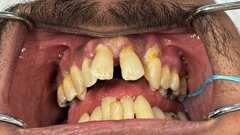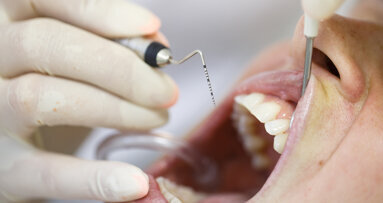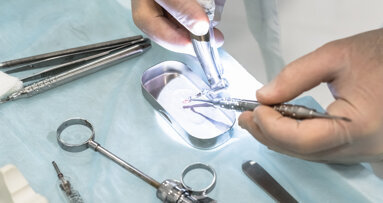SÃO PAULO, Brazil: Plant-derived therapies are attracting growing interest in dentistry. A recent study evaluated morin, a naturally occurring flavonoid found in fruits, vegetables, some herbs and other plants, for its anti-inflammatory, antioxidant and antimicrobial effects against periodontal pathogens. Tested alone and in a slow-release polymer formulation, morin demonstrated enhanced activity that could support non-surgical periodontal therapy and offer an alternative to antibiotics in managing periodontal infections.
Despite widespread reliance on adjunctive local antibiotics to manage residual periodontal pockets and furcation sites, their benefits are transient, and the growing threat of antibiotic resistance is eroding their clinical value. This reliance highlights the need to explore non-antibiotic adjuncts that can enhance treatment outcomes and long-term stability in periodontitis care.
Testing morin in the laboratory
Seeking to harness its natural properties for the prevention and treatment of dental caries and periodontal disease, researchers at the Araraquara dental school at São Paulo State University tested morin using an in vitro multispecies biofilm model that mimicked the effects of periodontitis on gingival tissue. Lead author Dr Luciana Solera Sales, a researcher in the department of morphology and paediatric clinical medicine at the university, explained in a press release that dietary intake of morin through fruit is insufficient for therapeutic effects.
In the study, both morin alone and its polymer-based formulation significantly reduced inflammatory markers, lowered oxidative stress and decreased the activity of key cytokine genes. In addition, both reduced microbial survival and biofilm biomass.
Overcoming delivery challenges
Although promising, natural compounds such as morin face challenges in oral application owing to poor water solubility and rapid clearance by saliva. To address this, Dr Sales developed and tested morin oral delivery systems in various forms during her PhD research, ultimately creating a fine powder resembling powdered milk that can be incorporated into a variety of oral hygiene products. “I prepared a solution containing sodium alginate and gellan gum to encapsulate morin in a controlled-release system, which is already widely used for drugs but isn’t yet widely used in dentistry,” Dr Sales commented.
“This controlled release also helps us control the toxicity and stability of the substance,” explained co-author Dr Fernanda Lourenção Brighenti, also a researcher in the department. She also emphasised the potential value of this polymer-based formulation for people with limited motor skills, such as older adults or patients with special needs, who often face difficulties with plaque control.
Towards clinical application
By testing morin for periodontal treatment, the researchers sought to create an alternative that avoids the side effects of existing adjunctive products, such as altered taste, increased calculus formation and tooth staining. Early results are promising not only for reducing biofilm growth but also potentially for avoiding tooth discoloration.
“We observed with the naked eye that the in vitro biofilm treated with morin in the laboratory is less stained than when treated in its free form. So, it’s possible that there’s an advantage, that this system helps prevent tooth discoloration. We also need to test, for example, whether morin maintains the balance of the oral cavity, because we don’t want to eliminate all bacteria from patients’ mouths,” Dr Brighenti concluded.
The study, titled “Anti-inflammatory, antioxidant, and antimicrobial evaluation of morin”, was published online in the October 2025 issue of Archives of Oral Biology.
Topics:
Tags:
LONDON, England: Balanced nutrition is known to lower the risk of major non-communicable diseases, including cardiovascular disease, neurodegenerative ...
Dr Dympna Kavanagh is chief dental officer in Ireland’s Department of Health and chair of the Platform for Better Oral Health in Europe. A specialist in ...
AMMAN, Jordan: As artificial intelligence continues to expand its role in healthcare, large language models such as ChatGPT are increasingly being used to ...
HELSINKI, Finland: The prevalence of adult periodontitis continues to pose a major global public health challenge, highlighting the need for evidence on the...
SILVER SPRING, Md., US: The US Food and Drug Administration (FDA) has finalised guidance on animal studies for dental bone grafting material devices, aiming...
Live webinar
Wed. 18 February 2026
12:00 pm EST (New York)
Prof. Dr. João Caramês CODE expert, Dr. Robert Gottlander DDS
Live webinar
Mon. 23 February 2026
3:00 am EST (New York)
Ass. Prof. Elizabeth Shick, Dr. Zehra Yonel
Live webinar
Tue. 24 February 2026
1:00 pm EST (New York)
Prof. Dr. Markus B. Hürzeler
Live webinar
Tue. 24 February 2026
3:00 pm EST (New York)
Prof. Dr. Marcel A. Wainwright DDS, PhD
Live webinar
Wed. 25 February 2026
11:00 am EST (New York)
Prof. Dr. Daniel Edelhoff
Live webinar
Wed. 25 February 2026
1:00 pm EST (New York)
Live webinar
Wed. 25 February 2026
8:00 pm EST (New York)



 Austria / Österreich
Austria / Österreich
 Bosnia and Herzegovina / Босна и Херцеговина
Bosnia and Herzegovina / Босна и Херцеговина
 Bulgaria / България
Bulgaria / България
 Croatia / Hrvatska
Croatia / Hrvatska
 Czech Republic & Slovakia / Česká republika & Slovensko
Czech Republic & Slovakia / Česká republika & Slovensko
 France / France
France / France
 Germany / Deutschland
Germany / Deutschland
 Greece / ΕΛΛΑΔΑ
Greece / ΕΛΛΑΔΑ
 Hungary / Hungary
Hungary / Hungary
 Italy / Italia
Italy / Italia
 Netherlands / Nederland
Netherlands / Nederland
 Nordic / Nordic
Nordic / Nordic
 Poland / Polska
Poland / Polska
 Portugal / Portugal
Portugal / Portugal
 Romania & Moldova / România & Moldova
Romania & Moldova / România & Moldova
 Slovenia / Slovenija
Slovenia / Slovenija
 Serbia & Montenegro / Србија и Црна Гора
Serbia & Montenegro / Србија и Црна Гора
 Spain / España
Spain / España
 Switzerland / Schweiz
Switzerland / Schweiz
 Turkey / Türkiye
Turkey / Türkiye
 UK & Ireland / UK & Ireland
UK & Ireland / UK & Ireland
 Brazil / Brasil
Brazil / Brasil
 Canada / Canada
Canada / Canada
 Latin America / Latinoamérica
Latin America / Latinoamérica
 USA / USA
USA / USA
 China / 中国
China / 中国
 India / भारत गणराज्य
India / भारत गणराज्य
 Pakistan / Pākistān
Pakistan / Pākistān
 Vietnam / Việt Nam
Vietnam / Việt Nam
 ASEAN / ASEAN
ASEAN / ASEAN
 Israel / מְדִינַת יִשְׂרָאֵל
Israel / מְדִינַת יִשְׂרָאֵל
 Algeria, Morocco & Tunisia / الجزائر والمغرب وتونس
Algeria, Morocco & Tunisia / الجزائر والمغرب وتونس
 Middle East / Middle East
Middle East / Middle East









































To post a reply please login or register